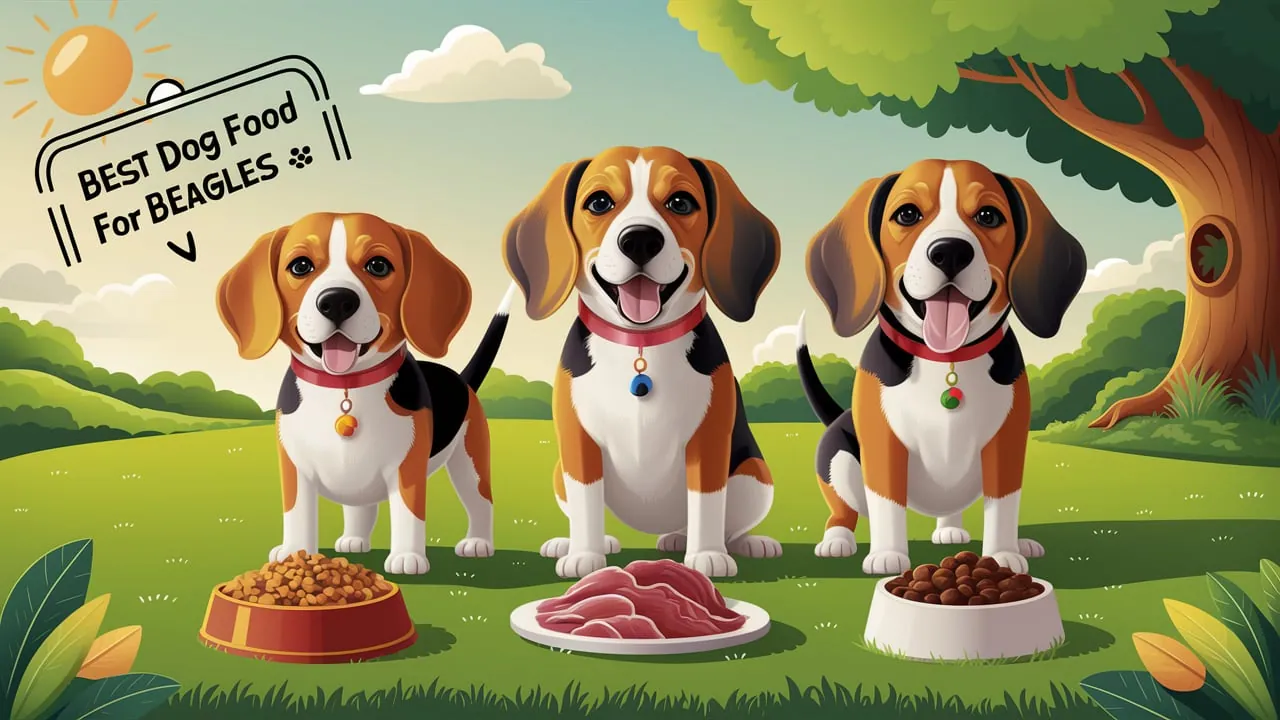Beagles, with their boundless energy and keen sense of smell, have unique dietary needs that require careful consideration. This comprehensive guide will help you choose the best dog food for your beagle, ensuring they stay healthy, happy, and full of life.
Beagles are active, medium-sized dogs with specific nutritional requirements:
- Protein: Beagles need high-quality protein to maintain their muscle mass and support their active lifestyle. Aim for foods with 25-30% protein content from named meat sources like chicken, lamb, or fish.
- Fat: Healthy fats are crucial for energy and coat health. Look for foods with 12-16% fat content, including sources like chicken fat or fish oil rich in omega-3 fatty acids.
- Carbohydrates: While not essential, easily digestible carbs provide energy and fiber. Opt for complex carbohydrates like sweet potatoes or brown rice, comprising about 30-40% of the diet.
- Vitamins and Minerals: Ensure the food contains a balanced blend of essential vitamins and minerals, particularly calcium and phosphorus for bone health.
Expert Tip: Dr. Sarah Johnson, DVM, recommends, “Beagles prone to weight gain should have their calorie intake carefully monitored. Aim for about 45 calories per pound of body weight per day for adult beagles.”
- Pros:
- Promotes dental health
- Convenient and affordable
- Longer shelf life
- Cons:
- Lower moisture content
- May be less palatable for picky eaters
- Pros:
- High palatability
- Higher moisture content (good for hydration)
- Often contains more meat protein
- Cons:
- More expensive
- Shorter shelf life once opened
- Less beneficial for dental health
- Pros:
- Control over ingredients
- Can be tailored to your beagle’s specific needs
- Often appealing to dogs
- Cons:
- Risk of nutritional imbalance if not properly formulated
- More time-consuming to prepare
- Potential for foodborne illness if not handled properly
Veterinary Insight: According to a survey conducted by the American Veterinary Medical Association, 72% of veterinarians recommend a mix of dry and wet food for optimal nutrition and hydration.
When choosing the best food for your beagle, prioritize these factors:
- High-quality protein sources: Look for named meats (e.g., “chicken” not “poultry by-product”) as the first ingredient.
- Healthy fats: Chicken fat, fish oil, or flaxseed oil are excellent sources.
- Complex carbohydrates: Sweet potatoes, peas, or brown rice provide energy and fiber.
- No artificial additives: Avoid foods with artificial colors, flavors, or preservatives.
- Age-appropriate formulas: Puppies, adults, and seniors have different nutritional needs.
- AAFCO statement: Ensure the food meets AAFCO (Association of American Feed Control Officials) standards for complete and balanced nutrition.
Based on our research and veterinary consultations, here are the top brands for beagles at different life stages:
- Royal Canin Beagle Puppy: Specifically formulated for beagle puppies
- Blue Buffalo Life Protection Puppy: High-quality ingredients with DHA for cognitive development
- Hill’s Science Diet Adult: Balanced nutrition with easily digestible ingredients
- Orijen Original: High protein content ideal for active beagles
- Nutro Ultra Senior: Contains a blend of superfoods and lean proteins
- Wellness CORE Senior: Grain-free formula with added glucosamine for joint health
Comparative Analysis:
Brand Protein % Fat % First 3 Ingredients Royal Canin Beagle Puppy 28% 14% Chicken by-product meal, corn, wheat Blue Buffalo Life Protection Puppy 27% 16% Deboned chicken, chicken meal, brown rice Hill’s Science Diet Adult 20% 11.5% Chicken, whole grain wheat, cracked pearled barley Orijen Original 38% 18% Fresh chicken meat, fresh turkey meat, fresh whole eggs Nutro Ultra Senior 26% 11% Chicken, chicken meal, whole brown rice Wellness CORE Senior 32% 12% Deboned turkey, chicken meal, lentils
When switching your beagle’s food, follow this gradual transition process to avoid digestive upset:
- Days 1-2: 75% old food, 25% new food
- Days 3-4: 50% old food, 50% new food
- Days 5-6: 25% old food, 75% new food
- Day 7+: 100% new food
Monitor your beagle closely during the transition for any signs of allergies or sensitivities, such as itching, vomiting, or diarrhea. If these occur, consult your veterinarian.
-
Can beagles eat grain-free food?
Yes, but it’s not necessary unless your beagle has a grain sensitivity. Recent studies suggest a potential link between grain-free diets and heart problems in some dogs, so consult your vet before choosing grain-free.
-
How much food should I feed my beagle daily?
Adult beagles typically need 1 to 1.5 cups of dry food per day, divided into two meals. However, the exact amount depends on age, weight, and activity level. Always follow the feeding guidelines on the food package and adjust as necessary.
-
Is wet or dry food better for beagles?
Both have benefits. Many veterinarians recommend a mix of wet and dry food to provide balanced nutrition and hydration while promoting dental health.
-
Are there any human foods safe for beagles?
Some safe human foods include plain cooked chicken, carrots, and blueberries in moderation. Always introduce new foods slowly and in small amounts.
-
What ingredients should I avoid in beagle food?
Avoid foods containing artificial preservatives (BHA, BHT), artificial colors, and generic meat by-products. Also, be cautious of foods with corn or wheat as the first ingredient, as these may not provide optimal nutrition for beagles.
Choosing the best dog food for your beagle is a crucial decision that directly impacts their health, energy levels, and overall well-being. By understanding your beagle’s unique nutritional needs and considering factors such as age, activity level, and potential health concerns, you can make an informed choice that will keep your furry friend happy and healthy for years to come.
By following this guide, you’ll be well-equipped to choose the best food for your beagle, ensuring they receive the nutrition they need to thrive. Remember, every dog is unique, so what works best may vary. Always consult with your veterinarian for personalized advice, especially if your beagle has specific health concerns or dietary requirements.
